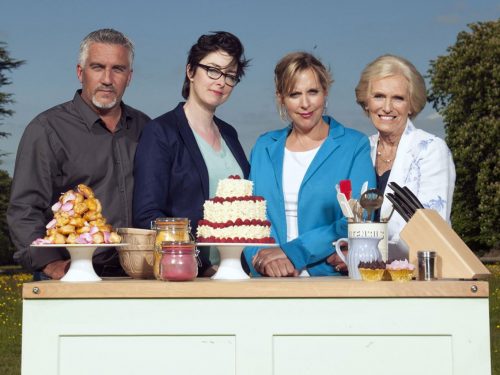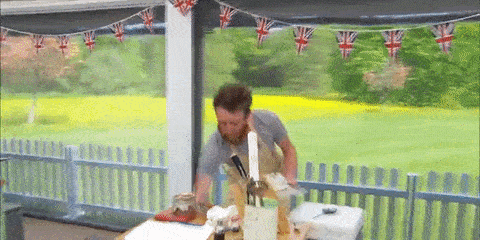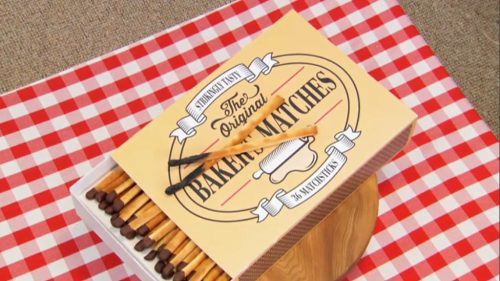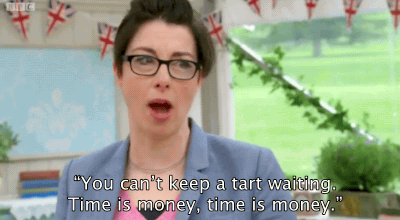I began watching “The Great British Bake Off” during a research trip in New Mexico. I had been hearing about this show for a while but had never taken a look, until three seasons of it appeared on Netflix (under its PBS title, “The Great British Baking Show”). I was instantly charmed by its combination of friendly competition, silly commentary, seriously helpful baking advice, and glamour shots of a British country estate.
As I (hungrily) watched that first season, I realized how many great lessons the show has – not only for bakers and but also for writers.
For those of you have not seen the show, here’s the deal: twelve amateur bakers gather in a tent on the grounds of that aforementioned country estate every weekend. Over two days of baking, they have three challenges:

- Signature, a “bake” they make for friends and family
- Technical, a minimal recipe provided by one of the two judges, Mary Berry and Paul Hollywood (apparently his real name); and
- Showstopper, a fancier, often tiered production that shows off advanced skills.
Mel and Sue explain each challenge and then announce in varying tones and accents, “On your marks, get set, BAKE!” Every week, one contestant is deemed “Star Baker,” and one is eliminated from the competition.
Each episode mostly involves scenes of bakers mixing, kneading, baking, and anxiously peering into their ovens. Through it all, the show’s hosts, Mel Giedroyc and Sue Perkins, check in with the contestants, offering help or sneaking bites of merengue or wriggling their eyebrows at the cameras. There is almost none of the interpersonal tension that American reality TV shows rely on for drama; the contestants have been, thus far, jovial sorts who help each other out rather than cut each another down.
They also run into problems and issues along the way, and the advice that the judges and hosts give them on these matters have increasingly struck me as applicable to the writing life.
For example:
Don’t overwork your dough.
In almost every episode involving bread or pastry, one of the bakers makes this mistake. Apparently (I’ve never made bread, so I don’t know), you have to work it until the glutens have developed enough to make the bake light and tasty. If you overwork the dough, it will become tough or won’t rise. It’s a delicate balance.
Overworking is endemic, I think, in the process of turning dissertations into books. This advice applies to shorter pieces too, however. Obviously, the revision process is vital to producing a tightly focused, clearly argued essay or manuscript. But there is a tipping point, a moment when revision becomes obsession. After this, writers just keep tinkering – and become increasingly fearful of sending their pieces out to readers and editors. This is a bad habit to get into, not only because it delays publication, but because overworked prose is actually “tough”: it usually makes sense but it’s not very enjoyable to read.
Don’t throw your bake in the bin.

During a showstopper challenge in the 2014 season, Irish construction engineer Iain discovered that the ice cream for his Baked Alaska had been taken out of the freezer and left on the counter, turning quite quickly into a puddle. He was (understandably) distraught and before Sue could stop him, Iain carried his bake over to the bin and chucked it in.
Writers have these kinds of meltdowns (ha! Mel and Sue would be proud) all the time. Some days, the right words just won’t come. Or they come, but they aren’t particularly good words in the right order, and the paragraph or section or chapter just sucks. Sometimes you know it’s a disaster from the start. Sometimes you’ll figure it out in the revision process.
Whatever you do, don’t delete the section that sucks. Copy and paste it into a “Desk Drawer” document, one that sits in your Dropbox file and just waits for you to click on it again. These bits of writing may not all be salvageable, but keep them just in case.
It should look good but it must taste great.
In the 2013 season, the textile designer Frances quickly gained a reputation for witty bakes: bread sticks that looked like match sticks (with their own box, even), garden party canapés that looked like carrots and tomatoes. The judges liked some of these but not all; they almost always advised her that while style is nice, substance is essential.

As anyone who reads this blog knows, I am a big fan of experimenting with innovative styles and structures and artful turns of phrase, especially in academic writing.
But I agree with Paul and Mary here: stylistic innovation cannot exist only for its own sake. It must have a purpose. That purpose can be giving the reader a vivid sense of place or personality, or it can be to clarify the argument. Or both.
If you’re writing solely to get to a witty punchline, or struggling to write something beautiful and it’s just not happening, you are only focusing on style and not on substance. Cut and paste that section into your “Desk Drawer” file and start again.
Always make a pun about buns.
One of the best features of “The Great British Bake Off” is Mel and Sue’s commentary. They make a lot of jokes (often at Paul’s expense) and indulge in a variety of baking related puns. This approach puts the contestants at ease in a high-stress situation.

Writing is serious business, but in my experience the very best writers have great senses of humor – about the world and about themselves. You have to be able to laugh about the craziness of this life we have chosen for ourselves.
Seek out people and things that make you laugh. Humor makes everything better, including your writing.
***
I haven’t finished watching all of the seasons of “The Great British Bake Off” – I have deliberately avoided binge-watching them so I can savor them. They are a lovely way to decompress from the anxiety of the news cycle, and to occupy my mind with other matters like what the difference is between a pudding and a cake.
I would love to know if any of you are also watching this show, and if you too have taken valuable writing lessons from it. In the meantime, let’s all get to writing something scrummy.
Simply scrummy essay! Ab Fab slice of life, and a tasty morsel of a metaphor. From pastry to pen, dough to dish, Indeed! A few more crumbs to add to the mix:
Food for Thought: Writing & Baking Nostalgia
I too am strangely addicted for the show, find it the perfect Friday night antidote to a busy week, and I don’t even bake. But I did live in England for a year, miss it terribly, and used to smuggle “HobNobbs” across the border before finding them in the grocery store back home, in the “International Food” aisle. Release the hounds!
This show captures the flavor of the culture in every which way—the craftsmanship, the “takes a village” mentality, the time honored tea breaks with sweets to pick up your day. We could be at war, but a light and airy Victoria sponge with raspberry and lemon curd filling could make you forget all that!
Watching this show sends me into a nostalgic, un-cynical, Mary Poppins tailspin. What I wouldn’t give to be back on my rickety bike with cautionary bell, cycling to the village bakery, for a fresh “Bloomer” (puffy loaf of bread), ideal for toast and marmalade, washed down with a cup of milky tea…”Oooh, lovely!”
And that’s what I love most about this show, and good writing! At the same time it makes me forget about my woes of the week, it also helps me remember. Writers and bakers: Don’t forget that double layer!
I do watch the show! I would apply a writing lesson from Paul and Mary: it comes down to knowing the basics. You can dress up a baked good with fancy decorations, but if you don’t know your marzipan from your frangipane, it’s pointless. Similarly, you can pull the big words out of your thesaurus and spend hours on clever chapter titles, but (for historians) if you don’t have good research and an evidence-based point, your textual cake will fall flat. When I get stuck in my writing, I tell myself to go back to the basics: what am I trying to say and what’s my evidence for that. And then I eat a pastry. One more lesson: blind bake your pie crust–this historian won her local summer pie contest! Thank you British bakers!
YES. That’s a great one. And also – even if they have no idea what the Technical bake item is or what it looks like, if they have the basics down they can usually get it close to perfect. I must confess to *still* not knowing what the hell frangipane is, however. ; )
And huzzah! on your pie contest win! That’s hardcore.